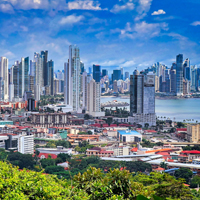Public Transportation in gorgona
Summary: Learning how to get around using public transportation in gorgona is an important step in adjusting to life in gorgona. In this article, we cover the local public transportation options.
Gorgona, Panama, a serene coastal town known for its beautiful beaches and laid-back lifestyle, offers a variety of public transportation options that cater to both locals and expatriates. While the town does not boast an extensive network like a major metropolis, it provides essential services that facilitate movement within and outside its boundaries. The primary modes of transportation include local buses, known as "colectivos," and taxis. For those considering a car-free lifestyle, Gorgona's public transportation combined with walking can suffice for daily needs, although having a car might be more convenient for frequent travel or for reaching more remote areas.
Buses (Colectivos)
In Gorgona, the bus system is the backbone of public transportation. The colectivos are minibuses that run along the Pan-American Highway, connecting Gorgona to nearby towns and cities. They are an affordable and relatively efficient way to travel, with fares typically costing just a few dollars depending on the distance. The buses are known for their colorful decorations and lively music, providing a cultural experience in addition to transportation. While they do not operate on a strict schedule, they are frequent enough during the day that waiting times are usually reasonable. However, service can be less reliable in the evenings or on weekends, so it's advisable to plan accordingly. Safety on these buses is generally good, but as with any public transportation, it's wise to keep an eye on personal belongings, especially during peak hours when they can become crowded.
Taxis
Taxis in Gorgona offer a more private and direct form of transportation. They can be hailed on the street or booked in advance, and while they are more expensive than buses, they remain affordable by international standards. Taxis do not have meters, so it's important to agree on the fare before starting the journey to avoid any confusion upon arrival. For expats and tourists, taxis provide a convenient option for getting around, especially when carrying groceries or traveling to areas not serviced by buses. Most taxi drivers are friendly and willing to negotiate fares, especially for regular customers. Safety in taxis is generally good, but it's recommended to use reputable taxi services and avoid unmarked vehicles.
Walking
For the environmentally conscious or those looking to immerse themselves in the local atmosphere, walking is a viable option in Gorgona. The town's compact size makes it possible to walk to beaches, local markets, and restaurants. Pedestrian infrastructure such as sidewalks and crosswalks may not be as developed as in larger cities, so caution is advised when sharing the road with vehicles. Walking is safe during the day, with the friendly community often greeting each other as they pass by. At night, however, it's recommended to stay in well-lit areas and be aware of your surroundings, as with any location.
While Gorgona does not have a subway system or other forms of mass transit like larger cities, its existing public transportation options provide a basic level of service that can be sufficient for daily life. Expats who choose to live in Gorgona without a car can manage by using the colectivos and taxis, supplemented by walking for shorter distances. However, for those who wish to explore beyond the immediate area, or who prefer the convenience and comfort of their own vehicle, having a car could enhance the living experience in this Panamanian paradise.
About the Author
 Joshua Wood, LPC joined Expat Exchange in 2000 and serves as one of its Co-Presidents. He is also one of the Founders of Digital Nomad Exchange. Prior to Expat Exchange, Joshua worked for NBC Cable (MSNBC and CNBC
Primetime). Joshua has a BA from Syracuse and a Master's in Clinical and Counseling Psychology from Fairleigh Dickinson University. Mr. Wood is also a licensed counselor and psychotherapist.
Joshua Wood, LPC joined Expat Exchange in 2000 and serves as one of its Co-Presidents. He is also one of the Founders of Digital Nomad Exchange. Prior to Expat Exchange, Joshua worked for NBC Cable (MSNBC and CNBC
Primetime). Joshua has a BA from Syracuse and a Master's in Clinical and Counseling Psychology from Fairleigh Dickinson University. Mr. Wood is also a licensed counselor and psychotherapist.
Some of Joshua's articles include Pros and Cons of Living in Portugal, 10 Best Places to Live in Ireland and Pros and Cons of Living in Uruguay. Connect with Joshua on LinkedIn.
Additional Information:



